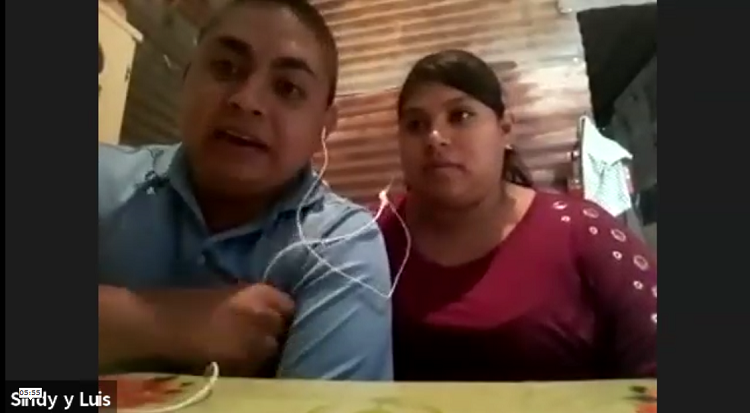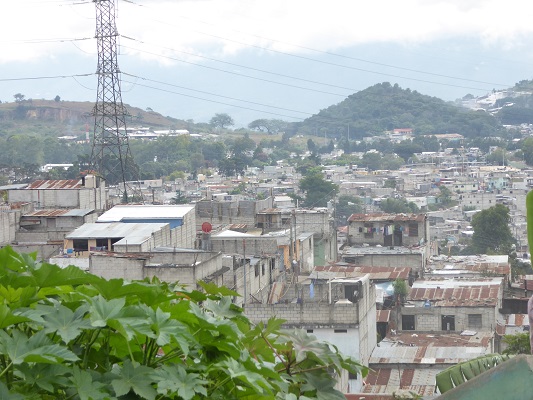We Got the Help: We Want to Share It

In Guatemala, as in many Latin American countries, the quarantine imposed by COVID-19 is preventing thousands of people from going out to work and making a living. For those in poverty, this could mean not even having salt on the table.
Luis Zepeda and Sindy Sequén are ATD Fourth World activists. In this text, which is an excerpt from an interview conducted through a video conference in May 2020, they explain what they do to care for and stand in solidarity with the most vulnerable people of their neighbourhood in Guatemala City.
They feel lonely, sad, abandoned
“They have fallen into an abyss. They can’t see either a beginning or an end,” explains Luis, referring to his neighbours. “They can’t find a way to work because now there’s no work, and so they have nothing to give their kids to eat, not even an omelette with salt… They feel lonely, sad and abandoned.”
“My friend said to me,
“Now there is no work, how are we going to feed our families? We don’t have a way out; we don’t have the economic stability that lets us stay at home.”
This is the situation that is happening throughout Guatemala. “If the coronavirus doesn’t kill us, my friend said, hunger will kill us, and if hunger doesn’t kill us, the gangs will.”
Another consequence of the quarantine, explains Luis, is the closure of schools and the confinement of children and young people in the neighbourhood, and what happens when children aren’t studying: “They are families withdrawn from society. Their sons and daughters are not going to study now and are vulnerable to participating in gangs, drugs and many other things that are prevalent around here. They are not studying, they don’t have choices, they aren’t around teachers who could teach them another way of being that doesn’t come from the internet. Their parents don’t have a way to give them food, or clothes…”
“Young people don’t have a voice here. How do you say to them that everything will be fine, to not worry, that we’re going to make it through? There isn’t any message of hope.”
For Sindy, she thinks it hits the youngest hardest. “I think about the children because they’re suffering too. They can’t go outside and they aren’t getting an education like they should.”
Sindy and Luis have a seven-year-old son who is taking classes via WhatsApp. They explain “His teacher is one of the few teachers who is dedicating herself to giving classes over WhatsApp, but we’ve realized that seven of the twenty-one children aren’t taking part in the classes. We don’t know how their parents are managing financially, we don’t know what they’re doing. There are a lot of parents who don’t know how to read or write and aren’t doing well financially. What will the children learn? What will happen to this lost education of the children? It’s something that worries us.”
We know people are going hungry and that motivates us to share
Like many other countries the authorities are helping those living in poverty.
“But, explains Luis, the help isn’t getting to everyone. There are other areas of the neighbourhood that are even poorer, they’re more disconnected to the society and they have no means of survival because normally they live hand to mouth and at the moment even that isn’t possible.”
“We were getting help and when I saw the need of the families, I thought we should share. I said to Luis we should share a bit of what we have,” Sindy recounted. “We saw the real need in the area of the neighbourhood up the hill, and so we started to go there to take food. We knew a woman there with very little who was caring for her granddaughter, and had no income coming in from either a husband or children, or anybody. The woman sold clothes but at the moment because of the crisis there are no sales, nothing, and so she has nothing.”
As ATD Fourth World activists, Sindy and Luis have a long history of community involvement with the most vulnerable people in their neighbourhood. A struggle that started from their own experiences. “We’ve also lived with poverty,” explained Luis. “When we first became a couple, our economic and emotional situation wasn’t very good. We know what it’s like to have absolutely nothing. We know what it’s like to be hungry, what it’s like to feel alone. We also know what it’s like when the children don’t have anything to eat.
“This is what motivated us to help, because at least now our income doesn’t leave us hungry. We’ve been there and this motivates us to share, to think about others, we know what it’s like and we want to do something so that somebody else doesn’t have to go through the same thing because it’s really hard.”
“I lived with my father and mother. They didn’t have dignified work; they didn’t have a way to get ahead. There were days when we didn’t have enough to eat. I remember when we ate only beans and rice for a whole year, just beans and rice. So, for us to really listen to people is really important because nobody listened to our parents, nobody took an interest, nobody gave them a hand to get out of that situation.”

Nobody came to see who we were
“We had a lot to contribute, a lot to give, a lot to say, but no one listened to us when we were kids, nobody listened to our parents, nobody listened to our brothers and sisters,” explained Luis.
“We know what it means to be alone, when nobody worries about you or takes the time to chat or ask how you are. So, if we are going to speak, we need to learn to listen as well. Listening motivates and enriches us.”
“I can’t be certain that what the families feel is the same as we felt when somebody listened to us, but I believe they are happy. Nobody, they thought, had come to listen to our feelings, to see how we are, to see what we think…That is what we experienced with Cristy (another ATD activist) when we went to visit some young people to see how they were coping during the quarantine. First the youngster came out, then the mother, then the father, then the siblings and we listened to them one by one. I know that for them it’s important to speak and have someone listen to them, to be able to let out all the pain they have inside their heart for different reasons.”
“People,” says Sindy,
“tell us what has happened, what they have lived, and they find someone with whom they can talk and not feel alone.”
For Luis and Sindy, to listen to their neighbours is also a chance to learn. “To share helps us know the histories of these families. We don’t stay stuck alone in what we live and do. Rather we are also in the lives of the other and what has happened to them,” adds Luis.
“To listen to them motivates us to be better people, to be able to be attentive not only to what everyone else says, but to what we say: to look inside ourselves and see what we can do and how we can contribute, not only to society, but to those who really need it.”
After this interview, the conditions during lock-down in Guatemala become even more difficult. And over time the weeks of being unable to work have added up and the precariousness and worry have grown in the most marginalised communities in Latin America and The Caribbean. In this context, commitments like Sindy and Luis’s to their neighbours are crucial for the survival of the poorest people and families.
This article is part of a series about the solidarity and mutual support that exists in the poorest neighbourhoods of Latin America during the COVID-19 pandemic. The objective of these articles is to raise awareness and learn from those in extreme poverty.

